He Says He’s “Done” I’m 30 Weeks Pregnant. AIBU?
I (f) have a 2.5‑year‑old, and I’m 30 weeks pregnant. My husband (we’ll call him “H”) has always had a long commute—about an hour in good traffic. He works full time 8–5; I work 3 days, 9–5, and also run a small business. We just moved. The toddler goes to nursery one extra day so I can keep on top of house stuff.
H leaves home at 5 a.m. so he can go to the gym first. He’s often not back until 8 p.m. or later. Sometimes he even works extra for a friend on Saturdays. I try to be understanding, but I end up doing all the parenting, walking the dog before I leave, making dinner once the toddler is in bed, handling most of the household chores. He helps sometimes — ironing, dishwasher, cooking on weekends — but it feels inconsistent.
I’ve repeatedly complained about the long hours and lack of presence. He has no patience, swears in front of our toddler (which I’ve asked him to stop), hides that he’s smoking (which I hate), and often ends up at the pub when walking the dog. Our child even asks to go to the pub because that’s where dad takes her. This week I was unwell; he came home “on time” but stayed up late working. As soon as I started feeling better, he reverted to old habits. When I bring it up, we argue. He tells me I complain too much, that I’m never happy. He says he’s done, that he’s given me a bigger house and “what more do I want?”
I just want him home more, helping me, giving me even one evening to myself. He pays the bills and mortgage (except food), and earns much more than I do. I feel like maybe he thinks paying means he gets to do what he wants. Am I being unreasonable? AIBU?
Having an unsupportive partner during pregnancy isn’t just inconvenient; it can take a serious emotional and physical toll

The author juggled a toddler, household chores, a large dog, and work, while her husband worked long hours and spent extra time at the gym, pub, and side jobs

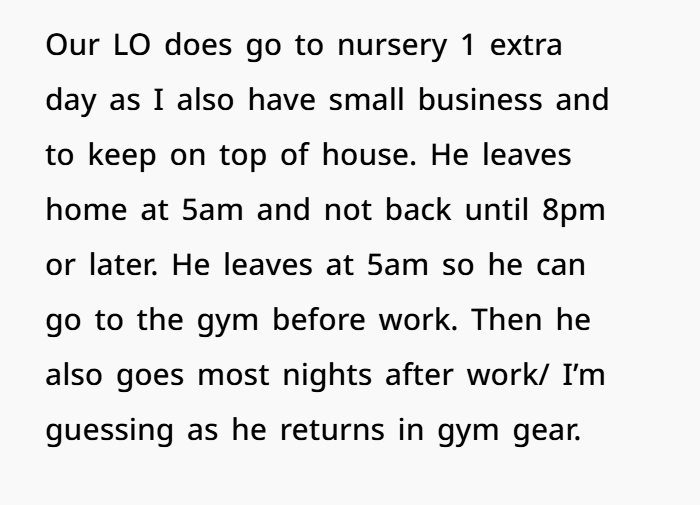
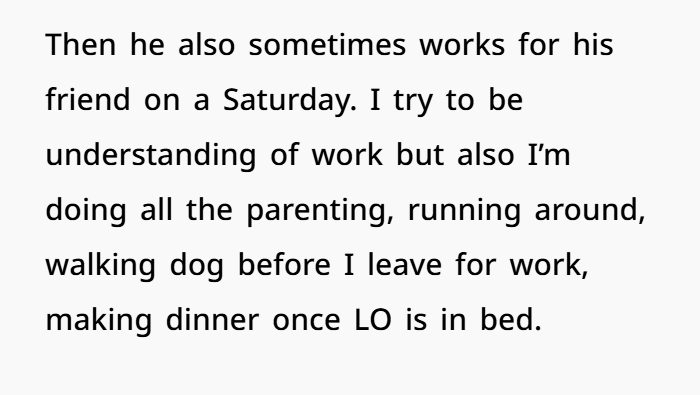


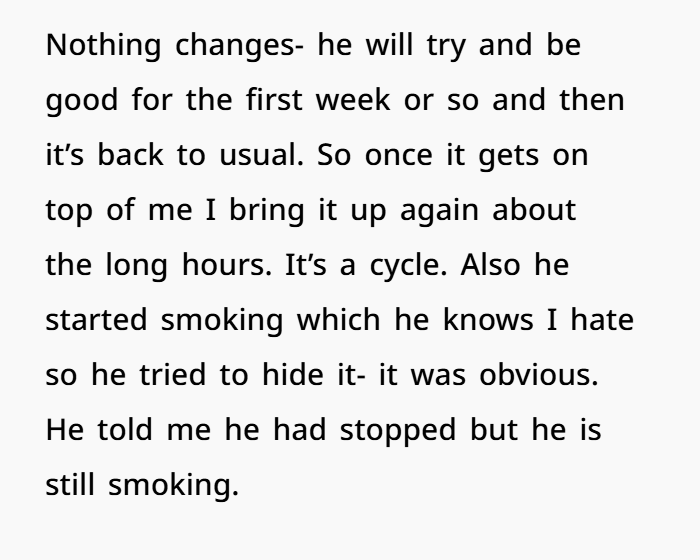

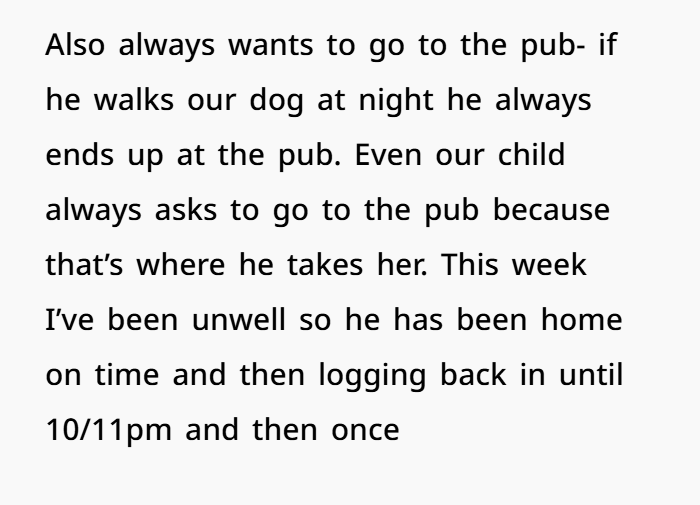
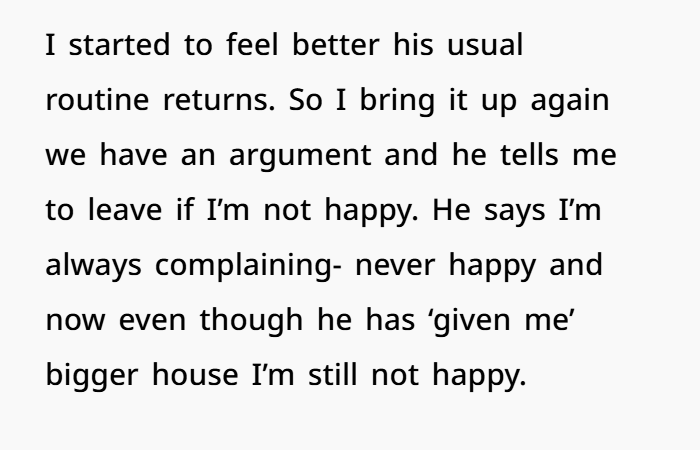
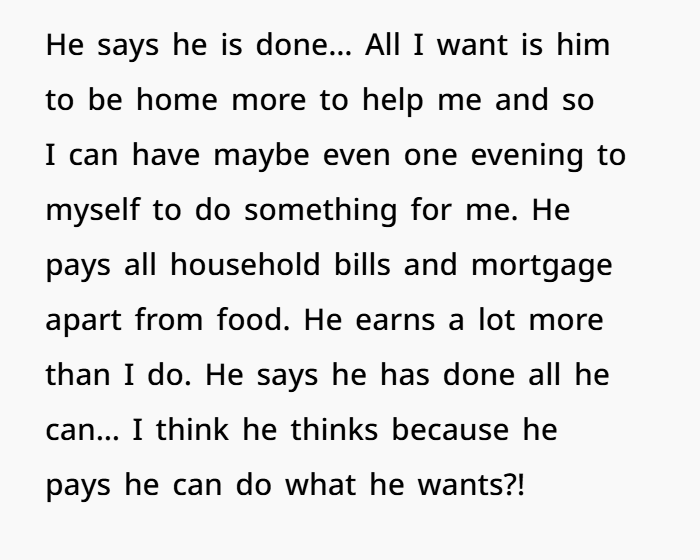
Emotional labor, mental load, and “unseen work”
One of the biggest culprits in relationship stress is emotional labor (keeping track of children, chores, mental scheduling) and the mental load (all the “what needs doing” you carry in your head). You are doing so much behind the scenes — dog walks, meals, house, toddler, business, pregnancy fatigue. That kind of load is draining. Relationship advice often emphasizes that when one partner shoulders most of it, resentment builds.

You’re not just tired physically — mentally exhausted. And long commutes + extra work make your husband less available, not just in hours but emotionally. You’ve told him, you’ve asked, but consistent change is missing. That gap between request and follow‑through is often where problems grow.
The “he pays” argument & transactional vs. relational marriages
You mention he pays mortgage & bills, and you partly internalize a dynamic: maybe because he pays, he “earns” the right to do as he pleases. But marriage (ideally) is relational, not transactional. Collective effort matters more than who pays what. If the balance is heavily skewed (he does “financial provision,” you do “everything else”), the relationship becomes unstable, especially during a vulnerable time like pregnancy.
Many couples reach crises during pregnancy or after a baby’s born — the stress, hormonal changes, physical demands, expectation of help spike. In marriage counseling work, you’ll see repeated patterns: one partner (often the pregnant or postpartum woman) feels abandoned, unseen, overwhelmed; the other partner feels pressured, resentful, or escapes via work or other outlets (pubs, extra jobs). These are common triggers for marital strain.
Boundaries, accountability, and he saying “I’m done”
When someone says “I’m done,” it’s often a threat, or a breaking point. It communicates emotional withdrawal. In counseling circles, that is serious — it means they’ve internally given up on attempts (or feel they’ve tried enough). Whether or not it’s a bluff, your feelings are valid: you feel pressured, unappreciated, isolated.
Boundaries are crucial. You can’t allow your energy, dignity, and body (especially when pregnant) to be at the mercy of someone’s inconsistent behavior. He must be accountable. You’ve asked more than once; it hasn’t sustained. That is not your failure — that’s him failing the commitment piece.
Smoking, hiding, pub nights — signs (or red flags) of avoidance
His secret smoking (though he says he stopped) and his recurring pub behavior when walking the dog could be symptomatic of avoidance coping. When confronted with conflict, discomfort, or pressure, instead of staying, some retreat. The pub becomes an escape zone. That he hides something you dislike (smoking) undermines trust further.
Trust and transparency are foundational. Lying about smoking is a breach. The “I’m done” argument often accompanies deeper issues — resentment, fatigue, feeling undermined. But it also forces you to absorb the emotional weight, because you don’t know how serious “done” is (temporary vs permanent).
Goals vs expectations: what does “being home more” really mean?
You asked for one evening to yourself, more involvement, presence. That’s a reasonable request. But sometimes what we ask vs what the other hears differ. For example:

- He might think “home more” means weekends only
- He may feel guilt, pressure, or like he’s failing at work
- Perhaps he envisaged “as long as I provide financially, I’ve done my job”
You two may be misaligned on expectations. One of you hears “help more” as “I’m ungrateful.” The other hears “I’m doing it all” as “you don’t care.” These communication mismatches can spiral.
Communication, empathy, therapy & action
Here are steps that might help (based on marriage counseling best practices):
- Dedicated talk (not mid-fight)
Pick a time you’re both calm. Say: “I’m drained, overwhelmed, and I need help.” Use I-statements: “I feel lonely, unsupported.” Avoid “you never” phrasing. - List & divide tasks concretely
Break down chores (dog walk, cooking, bedtime, bills). Ask: what can you take? Start small. Make a schedule. - Set one nonnegotiable boundary
Example: he does dog walk 3/week, or stays home 1 weeknight to spend time. He must stick to it. - Therapy / marriage counseling
A neutral third party can help both see patterns and rebuild empathy. It’s not a “weakness” to get help — it’s often the turning point. - Plan for your self‑care & support
You’re pregnant, you’ll soon have two small kids. You need outlets, rest, help from family/friends. Maybe outsource some chores, ask for babysitting, or get help in stressful weeks. - Clarify consequences (kindly but firmly)
If “I’m done” is said again, ask for specifics: what does done mean? Is separation on the table? What’s the timeline? You deserve clarity. If things don’t change, you may need to protect your well‑being and your children’s.
Why you’re not unreasonable — and where your strength lies
You’re not demanding luxury. You’re requesting presence, fairness, partnership. These are basic human and relational needs. You’re pregnant, carrying a child — your body has limits. You need support now more than ever.
Your strength: you’ve spoken up. You’ve articulated your needs. You’ve tried to compromise. You’re not gaslighting; you’re asking for respect. The tension or conflict that comes after raising boundaries is not your fault — often it’s the mark that boundaries were never allowed to exist before.
If he truly loves you and values the family, this moment can be a turning point—either for rededication or for realizing the mismatch is deep. It’s scary. But you deserve a partner who’s willing to try consistently, not only in bursts. And if he refuses or emotionally exits, you’re not drowning alone—get help, lean on support, protect your peace.
He also added that he was done with her, and netizens expressed their disgust and insisted the author was better off without him anyway
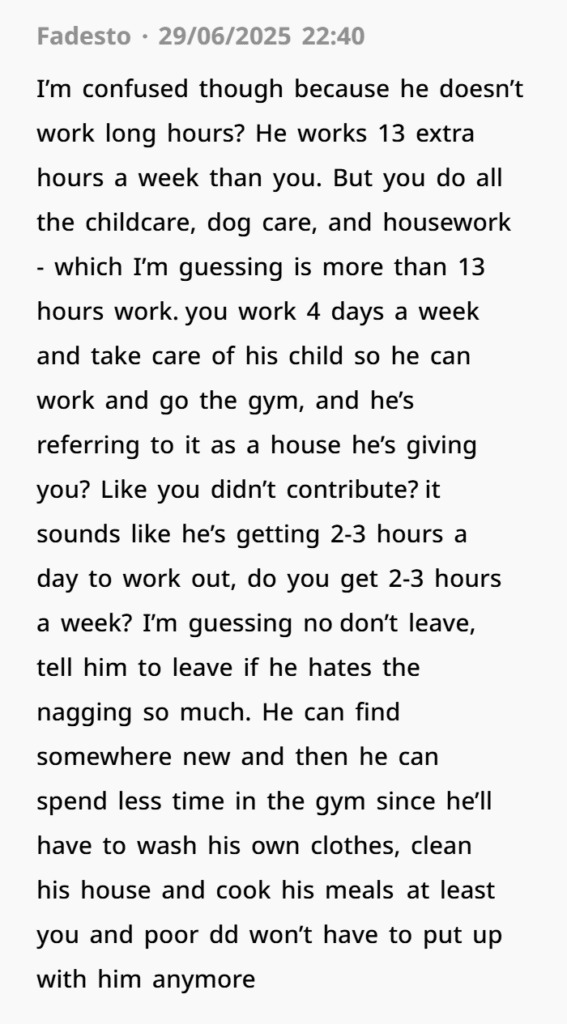
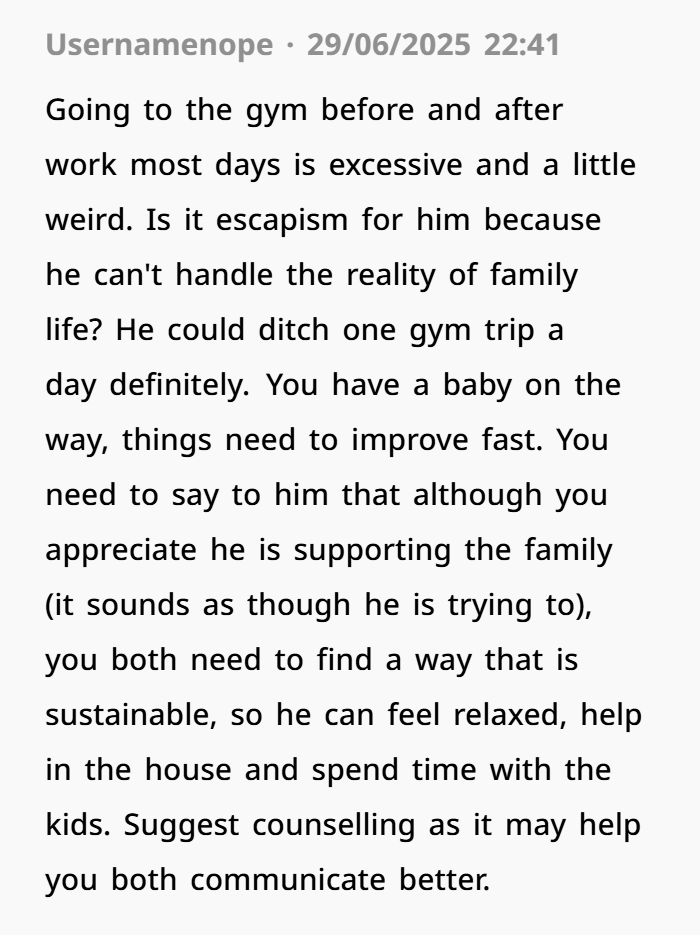
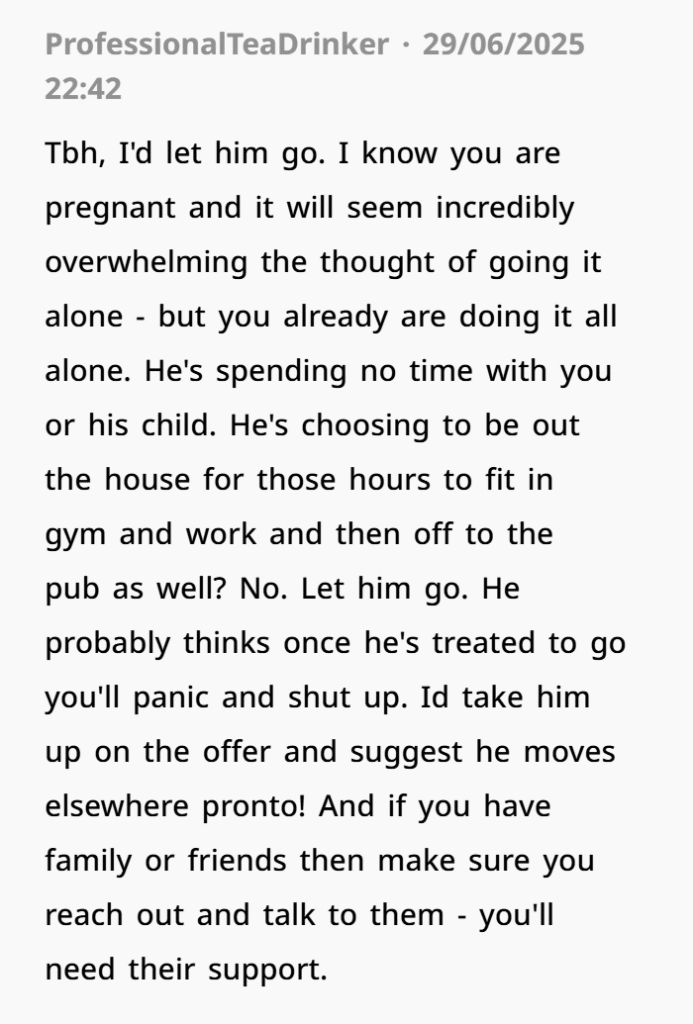


You are not in the wrong for expecting more from your spouse, especially at this stage in your life. Yes, tensions run high in pregnancy and when you have a toddler. But your requests are reasonable: more time, shared responsibility, respect.
Your husband saying “I’m done” is alarming. It demands clarity, confrontation, or mediation. It can’t be brushed away. You don’t deserve to be treated as “complaining” just because you’re voicing exhaustion.
You’re strong to speak up. Boundaries and needs matter. If things don’t improve despite honest efforts and communication, you may need to reevaluate whether staying in a partnership with someone who won’t meet you is healthy — not just for you, but for your children.

